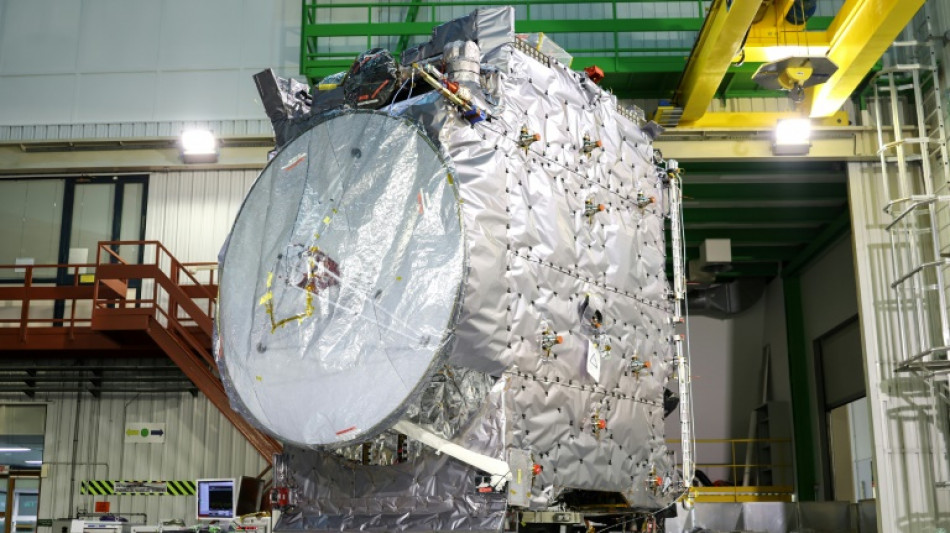
-
 Men's Fashion Week kicks off in Paris with tributes for Valentino
Men's Fashion Week kicks off in Paris with tributes for Valentino
-
Lake named as captain as Wales unveil Six Nations squad

-
 Royals visit deadly train crash site as Spain mourns
Royals visit deadly train crash site as Spain mourns
-
Police, pro-Kurd protesters clash at Turkey border with Syria

-
 Thai forces razed Cambodian homes on border: rights group
Thai forces razed Cambodian homes on border: rights group
-
Jellyfish-inspired Osaka battles into Australian Open round two

-
 Valentino taught us to respect women, says partner
Valentino taught us to respect women, says partner
-
Australia stiffens hate crime, gun laws after Bondi attack

-
 Mercedes chief designer Owen to leave F1 team
Mercedes chief designer Owen to leave F1 team
-
Trump unloads on allies as Davos showdown looms

-
 Moscow revels in Trump's Greenland plans but keeps concerns quiet
Moscow revels in Trump's Greenland plans but keeps concerns quiet
-
Global tourism hit new record level in 2025: UN

-
 Senegal poised to party with parade honouring AFCON champs
Senegal poised to party with parade honouring AFCON champs
-
Osaka emerges for Melbourne opener under hat, veil and parasol

-
 Dogsled diplomacy in Greenland proves elusive for US
Dogsled diplomacy in Greenland proves elusive for US
-
Almost half of Kyiv without heat, power, after Russian attack

-
 EU vows 'unflinching' response to Trump's Greenland gambit
EU vows 'unflinching' response to Trump's Greenland gambit
-
Osaka steals show at Australian Open as Sinner strolls through

-
 Brignone impresses in first run of Kronplatz giant slalom in World Cup comeback
Brignone impresses in first run of Kronplatz giant slalom in World Cup comeback
-
Osaka emerges for Melbourne opener under white hat and umbrella

-
 Malawi suffers as US aid cuts cripple healthcare
Malawi suffers as US aid cuts cripple healthcare
-
Bessent says Europe dumping US debt over Greenland would 'defy logic'

-
 Freeze, please! China's winter swimmers take the plunge
Freeze, please! China's winter swimmers take the plunge
-
Talks between Damascus, Kurdish-led forces 'collapse': Kurdish official to AFP

-
 In-form Bencic makes light work of Boulter at Australian Open
In-form Bencic makes light work of Boulter at Australian Open
-
Spain mourns as train disaster toll rises to 41

-
 Sinner into Melbourne round two as opponent retires hurt
Sinner into Melbourne round two as opponent retires hurt
-
Israel begins demolitions at UNRWA headquarters in east Jerusalem

-
 Almost half of Kyiv without heat, power, after Russian attack: govt
Almost half of Kyiv without heat, power, after Russian attack: govt
-
Veteran Monfils exits to standing ovation on Australian Open farewell

-
 Precision-serving former finalist Rybakina powers on in Melbourne
Precision-serving former finalist Rybakina powers on in Melbourne
-
South Korea's women footballers threaten boycott over conditions

-
 Equities sink, gold and silver hit records as Greenland fears mount
Equities sink, gold and silver hit records as Greenland fears mount
-
Australian lawmakers back stricter gun, hate crime laws

-
 EU wants to keep Chinese suppliers out of critical infrastructure
EU wants to keep Chinese suppliers out of critical infrastructure
-
AI reshaping the battle over the narrative of Maduro's US capture

-
 Penguins bring forward breeding season as Antarctica warms: study
Penguins bring forward breeding season as Antarctica warms: study
-
Vietnam leader pledges graft fight as he eyes China-style powers

-
 Ukrainian makes soldier dad's 'dream come true' at Australian Open
Ukrainian makes soldier dad's 'dream come true' at Australian Open
-
'Timid' Keys makes shaky start to Australian Open title defence

-
 Indiana crowned college champions to complete fairytale season
Indiana crowned college champions to complete fairytale season
-
South Koreans go cuckoo for 'Dubai-style' cookies

-
 Harris leads Pistons past Celtics in thriller; Thunder bounce back
Harris leads Pistons past Celtics in thriller; Thunder bounce back
-
Tjen first Indonesian to win at Australian Open in 28 years

-
 Long-delayed decision due on Chinese mega-embassy in London
Long-delayed decision due on Chinese mega-embassy in London
-
Djokovic jokes that he wants slice of Alcaraz's winnings

-
 Trump tariff threat 'poison' for Germany's fragile recovery
Trump tariff threat 'poison' for Germany's fragile recovery
-
Tourists hit record in Japan, despite plunge from China

-
 Jittery Keys opens Melbourne defence as Sinner begins hat-trick quest
Jittery Keys opens Melbourne defence as Sinner begins hat-trick quest
-
The impact of Trump's foreign aid cuts, one year on


Europe's JUICE mission to launch for Jupiter's icy moons
The European Space Agency's JUICE spacecraft is to blast off Thursday on an eight-year journey through the Solar System to discover whether Jupiter's icy moons are capable of hosting extraterrestrial life in their vast, hidden oceans.
The JUpiter ICy Moons Explorer (JUICE) has received the green light for its scheduled launch on an Ariane 5 rocket from Europe's spaceport in Kourou, French Guiana at 1215 GMT.
"The weather conditions are good," Guiana Space Centre director Marie-Anne Clair said on Wednesday in the control room, where Belgium's King Philippe was among those in attendance.
The six-tonne spacecraft, which is roughly four square metres, will separate from the rocket at an altitude of 1,500 kilometres (930 miles) a little under half an hour after blast-off.
Then begins JUICE's long and winding path towards Jupiter, which is 628 million kilometres from Earth.
Because the spacecraft lacks the power to fly straight towards Jupiter, it will have to slingshot around other planets to get a gravitational boost.
First, it will do a fly-by of Earth and the Moon, then slingshot around Venus in 2025 before swinging past Earth again in 2029.
Then it will finally take off on its challenging journey towards the Solar System's largest planet.
- 'Are we alone in the universe?' -
The spacecraft is wrapped in 500 layered thermal insulation blankets to protect itself against temperatures expected to soar above 250 degrees Celsius (480 degrees Fahrenheit) as it flies past Venus, then plummet below minus 230C near Jupiter.
It has a record 85 square metres of solar panels, which stretch out to the size of a basketball court, to collect as much energy as possible near Jupiter, where sunlight is 25 times weaker than on Earth.
Once the probe arrives at Jupiter in 2031 -- now with two billion kilometres on the odometer -- it will need to very carefully hit the brakes to enter the orbit of the gas giant.
From there, JUICE will focus on Jupiter's system, including the gas giant and its three icy moons Europa, Ganymede and Callisto.
Its 10 scientific instruments -- including an optical camera, ice-penetrating radar, spectrometer and magnetometer -- will inspect and analyse the moons' weather, magnetic field, gravitational pull and other elements.
Carole Mundell, the ESA's science director, said the Jovian system had all the ingredients of a mini-solar system.
Studying the system will allow scientists to investigate how our Solar System formed -- and ultimately attempt to answer the age-old question "are we alone in the universe?" she said.
The mission will not be able to directly detect the existence of alien life, but instead aims to establish whether the moons have the right conditions to harbour life.
- Liquid water -
First discovered by astronomer Galileo Galilei more than 400 years ago, Jupiter's icy moons were long ignored as potential candidates for hosting life.
But previous space probes have suggested that deep below their icy shells, there are huge oceans of liquid water -- the main ingredient for life as we know it.
That has made Ganymede and Europa prime candidates in the search for life in our celestial backyard.
Europa will be investigated by NASA's Europa Clipper mission, which is scheduled to launch in October 2024.
JUICE, meanwhile, has set its sights on Ganymede, the Solar System's largest moon and the only one that has its own magnetic field, which protects it from radiation.
In 2034, JUICE will slide into Ganymede's orbit, the first time a spacecraft has done so around a moon other than our own.
ESA director-general Josef Aschbacher said the 1.6 billion-euro ($1.7 billion) JUICE is one of the "most complex" spacecraft ever sent into the outer Solar System beyond Mars.
The launch comes as Europe is struggling to find ways to blast its missions into space following Russia's withdrawal of its Soyuz rockets in response to sanctions over the war in Ukraine -- as well as repeated delays to the Ariane 6 launcher and the failure of Vega-C's first commercial flight.
Thursday will mark the penultimate launch for Ariane 5 before it is replaced by the next-generation Ariane 6.
L.Janezki--BTB



